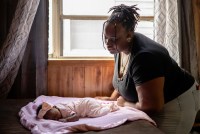Latest KFF Health News Stories
GOP-Led States Expand Crackdowns on Transgender Care
South Carolina’s legislature is poised to pass a bill prohibiting doctors from offering some health-care services to transgender minors — part of a new wave of anti-trans legislation from Republican-led states. The South Carolina bill, which passed the state House of Representatives in January and is under consideration in the Senate, would bar health-care providers […]
Lawsuits Claim South Carolina Kids Underwent Unnecessary Genital Exams During Abuse Investigations
Lawsuits allege that several children under 18 in South Carolina have undergone examinations of their private parts during child abuse investigations — even when there were no allegations of sexual abuse. There’s a growing consensus in medicine that genital exams can be embarrassing, uncomfortable, and even traumatic.
Southern Lawmakers Rethink Long-Standing Opposition to Medicaid Expansion
While many Republican state lawmakers remain firmly against Medicaid expansion, some key leaders in holdout states are showing a willingness to reconsider. Public opinion, financial incentives, and widening health care needs make resistance harder.
Insurance Doesn’t Always Cover Hearing Aids for Kids
California’s governor vetoed a bill extending insurance coverage for kids with hearing loss, but most states now require it.
What Would a Nikki Haley Presidency Look Like for Health Care?
Former South Carolina Gov. Nikki Haley’s tenure in the Palmetto State — which overlapped with several tumultuous years of health care reform — and her recent comments offer clues to how her presidency might affect national health care policy.
‘They See a Cash Cow’: Corporations Could Consume $50 Billion of Opioid Settlements
As opioid settlement dollars land in government coffers, a swarm of businesses are positioning themselves to profit from the windfall. But will their potential gains come at the expense of the settlements’ intended purpose — to remediate the effects of the opioid epidemic?
Being Black and Pregnant in the Deep South Can Be a Dangerous Combination
Being Black has always been dangerous for pregnant women and infants in the South. And researchers say things are continuing to move in the wrong direction.
Candidates Clashed But Avoided Talk of Abortion at 4th GOP Primary Debate
Obamacare had its moment, but not until the faceoff’s final minutes. Front-runner Donald Trump again was not on the debate stage, leaving the other Republican presidential hopefuls to slug it out to break through and gain voters’ attention.
Desperate Families Search for Affordable Home Care
Facing a severe shortage of aides and high costs, people trying to keep aging loved ones at home often cobble together a patchwork of family and friends to help.
GOP Presidential Hopefuls Use Trump’s Covid Record to Court Vaccine Skeptics
Candidates see former President Donald Trump’s embrace of his administration’s covid-19 vaccine policies as an opportunity to gain ground. So far, their efforts haven’t found traction.
Estrategia de Trump y sus adversarios de campaña: desinformar sobre las vacunas contra covid
La dinámica resultante podría impactar más allá del ciclo electoral, y afectar la política de salud pública en los próximos años. Y afectar a otras importantes vacunas.
How the Thyroid Gland Mystifies Doctors and Patients
This illustrated report has been adapted from a KFF Health News article, “Many Autoimmune Disease Patients Struggle With Diagnosis, Costs, Inattentive Care” by Andy Miller, with artwork by Oona Tempest.
Adult Children Discuss the Trials of Caring for Their Aging Parents
The financial and emotional toll of providing and paying for long-term care is wreaking havoc on the lives of millions of Americans. Read about how a few families are navigating the challenges, in their own words.
Feds Try to Head Off Growing Problem of Overdoses Among Expectant Mothers
Homicides, suicides, and drug overdoses have driven rising rates of pregnancy-related death in the U.S. This fall, six states received federal funding for substance use treatment interventions to prevent at least some of those deaths.
A Decades-Long Drop in Teen Births Is Slowing, and Advocates Worry a Reversal Is Coming
After three decades of declines in teen pregnancies, data shows the rates are starting to plateau. The reversal of “Roe v. Wade,” coupled with efforts to suspend sex education in schools and higher rates of youth mental health issues post-pandemic, could culminate in a perfect storm.
Con cambios en Medicaid, residentes de zonas rurales se sienten abandonados a su suerte
En las zonas rurales, la falta de acceso a navegadores, las personas que ayudan a los beneficiarios de Medicaid a mantener su cobertura o encontrar otro seguro si ya no reúnen los requisitos, podría agravar estas dificultades.
How Will Rural Americans Fare During Medicaid Unwinding? Experts Fear They’re on Their Own
As states review their Medicaid rolls after the expiration of a pandemic-era prohibition against kicking recipients off the government insurance program, experts say the lack of help available to rural Americans in navigating insurance options puts them at greater risk of losing health coverage than people in metropolitan areas.
‘Conscience’ Bills Let Medical Providers Opt Out of Providing a Wide Range of Care
Opponents of the wave of state legislation say the measures place health providers’ preferences over patients’ rights.
Meet the People Deciding How to Spend $50 Billion in Opioid Settlement Cash
As settlement dollars land at the state level, state councils wield significant power in determining how the windfall gets spent. And, though they will likely include the most knowledgeable voices on addiction, these panels also face concerns about conflicts of interest and other issues.
New Charleston Museum Nods to Historical Roots of US Health Disparities
The $120 million International African American Museum that opened this week in Charleston, South Carolina, allows visitors to step back in history at Gadsden’s Wharf, where tens of thousands of enslaved Africans arrived in America, the genesis of generations of health disparities.
























